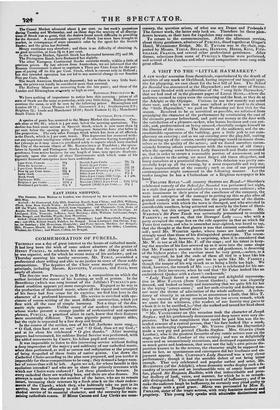COMMEMORATION OF PURCELL.
THURSDAY was a day of great interest to the lovers of cathedral music. It had long been the wish of some ardent admirers of the genius of HENRY PURCELL, to celebrate his memory in the Abbey of which be was organist, and for which he wrote many of his anthems ; and on Thursday morning his worthy successor, Mr. TURI.E, assembled a professional choir willing and able to do justice to some of these noble compositions. The deputies of the Choir were mostly present; the principals, including Messrs. KNYWETTS, VAUGHAN, and SALE, were nearly all absent.
The Service was PURCELL'S in B flat ; a composition on which the author lavished the stores of his learning, as well as genius. In the Benedictus (which was sung instead of the Jubilate) PURCELL'S pro- found erudition appears yet more conspicuous. Engaged as he was in the production of theatrical music, where all the vigour and versatility of his fancy had free scope for its exercise, we find him here in the character of a profound harmonist. His service is enriched with spe- cimens of canon-writing of the most difficult construction, which yet flow with all the ease of simple harmony. Not a tinge of the dra- matic style appears. Unlike many of our modern church-writers, whose works present a strange jumble of ecclesiastical and operatic phrases, PURCELL, a practised artist in each, knew that their features were essentially different. The same gigantic power appears alike, but the style is separated by a line deep and broad. In the course of the service, two of his full Anthems were sung,- " 0 God, thou bast cast us out," and " 0 God, thou art my God ;" and at its close his celebrated " 0 give thanks." After morning Forayers had terminated, his sublime Burial Service was performed, with the added movements by Caorr, his fellow pupil and successor.
It was impossible to listen to this interesting service without feeling a deep impression of the majesty and sublimity of our cathedral music, when thus performed, as well as sorrow and indignation at the prospect of being despoiled of these fruits of native genius. Cut down the Cathedral Choirs according to the plan now proposed, and you render it impossible for these compositions to be sung; they demand a larger num- ber of voices than will be left. Again we ask, for whose benefit is this spoliation intended ? and who are to share the princely revenues with which our Choirs were endowed ? Let these plunderers beware. In every cathedral there are working bees, and there are also drones. No attempt is made to lessen the number of the latter, who are to remain intact, increasing their revenues by a fresh attar k on the choir endow- ments of the Church ; which they, who habitually take no part in its service, have the effrontery to call " unnecessary." Despoil the ca- thedral service of its essential character, and the necessity for main- taining cathedrals ceases. If Minor Canons and Lay Clerks are unne-
cessary, the question arises, of what use are Deans and Prebends? The former work, the latter only look on. Therefore let these plun• derers beware, or their turn for expulsion may come next.
To return to the commemoration. After the afternoon service, about thirty gentlemen, admirers of PURCELL, dined together at Ginger's Hotel, Westminster Bridge. Mr. E. TAYLOR was in the chair, sup- ported by Messrs. TUELE, BELLAMY, HAWKINS, HOBBS, KING, FITZ.. WILLIAM, Famecis, and several other professional gentlemen. After dinner, selections from some of PuacELL's Operas were performed, and several of his Catches and other vocal compositions were sung with great effect.


























 Previous page
Previous page